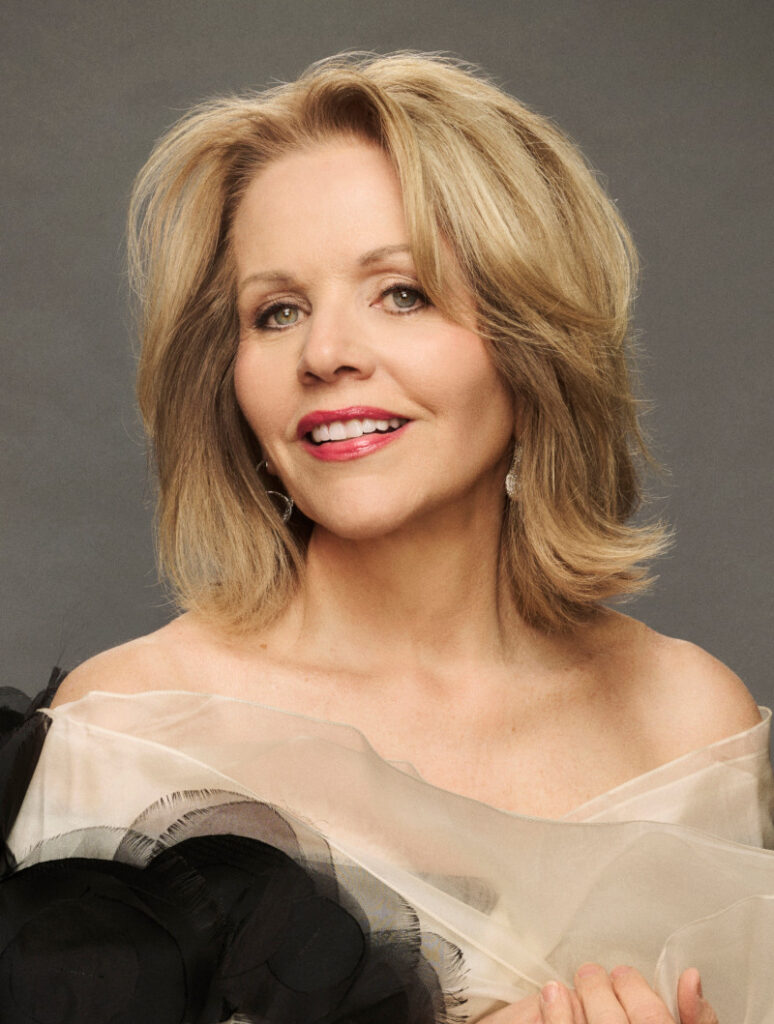“Renée Fleming sings Strauss” shouted all the publicity for this concert, omitting to mention the program was 75% Wagner. Conductor Thomas Guggeis hardly got a look in, yet his successes precede him at Staatsoper Unter den Linden and the Frankfurt Opera (where he is currently director). But in fact, Guggeis was the real star of the evening: his Wagner was lean and full of understanding. And his work with voice was exceptional …
… which brings us to Fleming and Strauss’s Vier letze Lieder, masterpieces of Strauss’s autumnal blossoming. Whether Fleming’s generally quiet dynamic level throughout was a necessity or a conscious decision, her voice became but one strand in Strauss’s exquisite fabric. Guggeis found peace profound in pianissimos and glorious voice and flute interaction when Hesse’s text mentions “Vogelgesang” in the first song, ‘Frühling.’ He was careful throughout and never overwhelmed Fleming.
But the trade-off was intelligibility; printed texts were most definitely needed. Guggeis found sparking orchestral sonorities in ‘September’ (again Hesse); surprising, then, that Annmarie Federle’s horn solo was rather nondescript (memories of her stepping in for a sick Ben Goldsheider in Knussen’s Horn Concerto come flooding back: a spectacular performance). A shame, too, that the articulation between voice and strings did not quite match at the opening of ‘Beim Schlafengehen’ (the last of the Hesse songs).

The final song is to a text by Eichendorff: ‘Im Abendrot,’ and how Guggeis persuaded his players to present the opening gesture as one great sonic out-breath. Again, though, diction suffered; ironically, Fleming’s triumph in that department was the final word, “Tod”; just the right split between a ‘t’ and a ‘d’ on the final ‘d’. Crowned by superb flute trills, Strauss’s sunset faded to nothing. Fleming’s voice remains beautiful, without a doubt, and she has a deep understanding of Strauss’s writing. The encore, ‘Morgen’ is arguably Strauss’s greatest song and held a phenomenal violin solo from Pieter Schoeman.
The balance was Wagner: no vocalisms in the ‘Liebestod.’ Guggeis’s tempo for the Prelude to Tristan was surprisingly fast; it could almost have been two in a bar. Against this was a high sensitivity of phrasing, almost call and response feel. The dynamic range was huge, from what must have been pppp to the hugest, but well-balanced, climax. The ‘Liebestod,’ too, was swift but characterized by warmth, chords beautifully balanced.
It surprised me – and maybe others, too – that the three pieces in the second half were one long tone poem. Guggeis ensured no gaps between Tannhäuser, Lohengrin, and Meistersinger, an interesting sleight. The move from the muscularity of the Tannhäuser Overture to the sensuality of the music was expertly negotiated, while the trickier corners of the Tannhäuser Overture were miraculously precise. A good idea, too, to juxtapose the gossamer textures of the Prelude to act I of Lohengrin with the broad sunlight of Meistersinger, the LPO stings luminous and perfectly controlled in the former, the latter a masterclass in grandeur from the brass.
The LPO has a grand tradition with Wagner: from Tennstedt (a program of bleeding chunks, including the Tristan excerpts here, but with Jessye Norman) to Jurowski’s recent Ring triumphs. Good to hear the tradition continuing.
Colin Clarke
Renée Fleming (soprano), London Philharmonic Orchestra, Thomas Guggeis (conductor).
Wagner – Prelude und Liebestod from Tristan und Isolde; R. Strauss – Vier letzte Lieder; Wagner – Tannhäuser – Overture and Venusberg Music; Lohengrin – Prelude to Act 1; Der Meistersinger von Nürnberg – Overture.
Royal Festival Hall, Southbank Centre, London, 5 March 2025
Top image © LPO